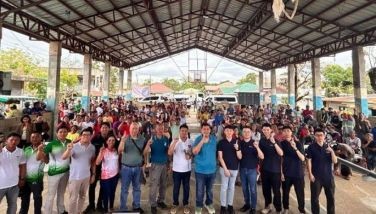Hometown elections

My household woke up early yesterday and marched off to the Valle Verde II clubhouse in Pasig to cast our votes for our new sets of national and local leaders. We waited for the PCOS machines to be installed, and filled out the voting forms in a jiffy. Around us people were asking friends and seatmates for names of Pasig council candidates. Someone said, “No, this is not electioneering, it’s just that we don’t know the local candidates.â€
For my part, I dug into my handbag for my codigo (written down as my memory, like yours, very often fails me these days) and properly marked the names of 12 senatorial candidates, led by Loren Legarda and Dick Gordon, and of course, Roman Romulo for Pasig congressman and Maribel Eusebio for mayor. Three small cards fell out of my bag, and saw the crayola-scribblings on them, saying, “Happy Mother’s Day.†They had been prepared the day before by Sunday School kids at the Capitol Community Church in Baryo Kapitolyo, Pasig, and presented to us mothers after the church service.Our voting at the Valle Verde clubhouse and the Mother’s Day celebration in church brought back to my mind the local elections in Gingoog, my hometown, in 1959. I was in college at Silliman (in Dumaguete City, Negros Oriental — for the benefit of those who don’t know where it is) when my mother, who was in Gingoog, wrote to ask what I thought about her being invited by the local Liberal Party leaders to join their councilor’s slate in the coming November 1959 election. I was quick to wire her back the verse, “For all things work together for good to them that love God and do things according to his purpose†(Romans 8:28).
My mother won. She was the first woman to run for public office in our town. She was not just a novelty; she was a good public speaker. In her elementary days she was a declaimer and an orator, and the townsfolk of Milagros, Masbate (where her folks originally lived, in a large wooden house surrounded by plots of sampaguita), knew her as the little girl whose father made her stand on a big rock and recite Jose Rizal’s Ultimo Mi Adios word for word, and with feeling.
She was an entrepreneur, running a vocational school where the town’s ladies learned to sew dresses and cut and curl the hair of their contemporaries. She played the piano and the violin, and raised a nice garden of roses and dahlias. But her being a Protestant who preached at the United Church of Christ in the Philippines church in Gingoog was her qualification that the other candidates in a dominantly Roman Catholic town made much of. At this time, Catholics and Protestants were not on friendly terms. Mama’s opponents said if elected, she would have the statues of saints torn down, and convert people to her faith.
But people flocked to where she held rallies, demolishing her opponents’ charge that she would proselytize and turn the town into the Protestant fold. That was nonsense, she said, she believed in ecumenism — a term not yet understood until the 1960s.
And she warned against the possibility of communism taking over the minds and hearts of the population. This, the people in the audience, listened to attentively. Standing quietly among the listeners was her husband, Greg, a CPA, who had encouraged her to run, saying her untainted reputation would win her the people’s trust and votes.
When Election Day was just around the corner, lack of funds became a problem. What to do with her opponents making merry with invited film stars from Cebu coming over to sing and dance in the town plaza, with loud speakers blaring like crazy?
Not to worry, said my brother Warto, an instructor at Gingoog Institute, choreographer and jester. He rounded up his friends, cut cardboards, painted them with the words “Vote for Corazon Torrevillas, for Councilor†on them, tied strings on the upper corners of the placards and hang them around their necks. Then they borrowed pots and pans and salvaged empty cans from their neighbors. Kids they mobilized banged on the kitchen utensils, causing so much noise everyone went out to the streets to see what was going on. “Uy, si Mrs. Torrevillas man di-ay,†they said.
Mama won. She was probably No. 2 or No 3.
Looking back on that pots-and-pans day, Warto, who teaches humanities at Lyceum of the Philippines in Manila today, says unobtrusive measures had to be employed to compete with the come-ons of the moneyed opponents.
Warto had also seen what an awesome figure her mother cut.
He and his best friends went campaigning in the upland barrios. At noontime one day they were hungry and had brought no baon.
When they came close to a modest-looking house, one of them asked, “Do you think it’s okay if we ask for food?â€
“Ambut lang uy,†another replied (I don’tknow).
They knocked at the door. An elderly woman came out. They said they were campaigning for Mrs. Torrevillas.
Then the bolder one said, “May we ask for water to drink?â€
“Sure,†the woman answered. She went inside the house and returned with five glasses of water. “By the way, have you eaten? We have leftover rice,†she said.
“Oh yes, we welcome that,†Warto said, and wished she would bring some viand to go with the rice.
Just then a young woman came out, and she exclaimed, “Nay, si Warto man ni, anak ni Mrs. Torrevillas, kadtong tag-iya sa vocational school nga diin ko nag-eskwela ug dressmaking†(This is Warto, whose mother owns the vocational school where I learned to sew.) Hearing this, the mother said, “Uy, diay? Hala, pagabri ug sardinas para kan-on nila. Intawon gigutom na kining mga bata†(Bring out a can of sardines, these kids must be awfully hungry).
Warto had wished there would be a chicken stew. But never mind, they all ate with gusto. The mother and daughter called out to the neighbors and asked them to vote for Mrs. Torrevillas.
As a councilor, Mama worked for legislation intended to improve the plight of her kababayans. Her vote was decisive in the transfer of the public market site to the main highway, a resolution intended to expand the city eastward, which happened.
Mama ran for vice-mayor in the next election. She lost. She passed away 14 years ago, but she left an imprint in the town’s history of progress and development.
Perhaps tomorrow the elected mayor of Gingoog, now a city, will be known. Whoever the new mayor will be will have good reason to celebrate the city’s fiesta on May 22.
* * *
FemaleNetwork.com features 100 amazing women who show that adversity only serves to make strong women stronger. My niece, Zonito, named after my mother, Corazon Torrevillas, talks about her advocacy, malunggay, as a health product. It’s not that I am her aunt, that’s why I find her malunggay juice, bread with malunggay and shing-aling, tasty products; they are tasty. Find out what women, like Zonito, are doing to help others in need. Visit FemaleNetwork.com to read the stories of 100 amazing women of the Philippines.
* * *
My email: domintorrevillas@gmail.com
- Latest
- Trending























